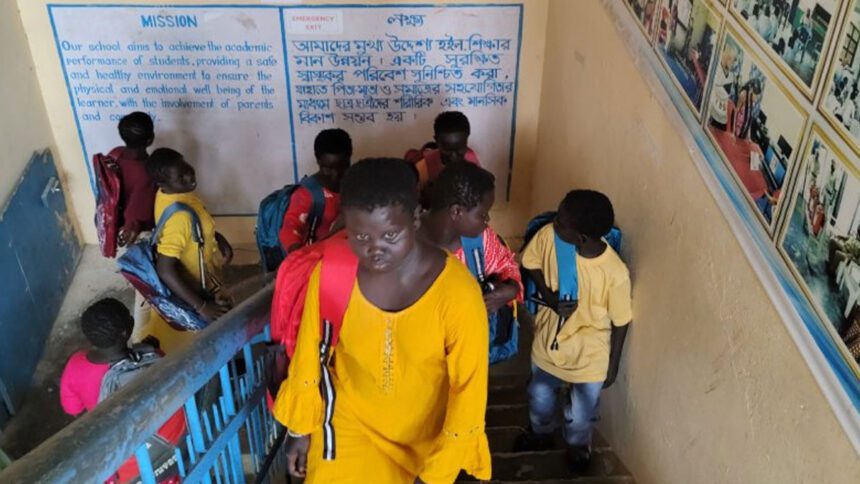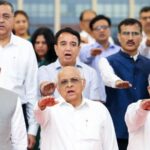Nine students from the Onge community, a Particularly Vulnerable Tribal Group (PVTG) in the Andaman and Nicobar Islands, have achieved a significant milestone by passing the CBSE Class 10 examinations, marking the first time since India’s independence that members of this community have advanced to Class 11. The successful students attend PM SHRI Government Senior Secondary School in R.K. Pur and are considered first-generation learners. The Ontge community has historically remained isolated and non-literate, with their recent success linked to targeted support from the Andaman Adim Janjati Vikas Samiti (AAJVS) and the Department of Education, as well as local and mainstream media assistance.
While this achievement is celebrated as a watershed moment, it raises critical questions regarding the fragile status of these tribes within India’s broader development narrative. The existing mainstream educational system presents fundamental challenges and ethical dilemmas about the development of indigenous education, which require careful consideration.
Compounding these concerns is a societal emphasis on individual ambition over collective responsibility. It is crucial to recognize the tribe as a distinct community with its own identity, traditions, and history. The Onge community, one of five PVTGs in the region—alongside the Great Andamanese, Jarawas, Shompens, and uncontacted Sentinelese—are semi-nomadic hunter-gatherers with a profound spiritual and ecological connection to their ancestral lands. As per the 2011 Census, the Onge population was reported at 112; following their relocation after the 2004 tsunami, this figure has slightly increased to 140, comprising 74 males and 66 females.
Records from the Ministry of Tribal Affairs (2022-23) indicate that PVTGs only receive a fraction of the tribal welfare budget, with a greater portion allocated to mainland Scheduled Caste and Scheduled Tribe populations. The AAJVS, essential to tribal welfare in the islands, has faced criticism for bureaucratic inefficiency and for lacking a culturally sensitive, participatory development approach.
Despite this academic progress, the slow population growth and cultural erosion within the Onge community remain pressing issues. Historical records indicate that the Onge population has declined from 672 in 1901 to approximately 140 today, positioning the community on the brink of extinction. Therefore, every policy must serve not just as a tool for assimilation but also as a means of cultural preservation.
The formal education system, primarily delivered in Hindi or English following the CBSE syllabus, is unlikely to incorporate elements of Onge heritage. This lack of culturally relevant curriculum presents a risk of further marginalization of their language and traditional knowledge systems. It is vital to question whether the current educational framework meets the needs and aspirations of these tribes, or if it exacerbates their alienation by distancing them from their cultural roots.
In a research paper entitled “Onge Tribe through the Ages: Continuity of Change,” Ashish Gupta notes that significant changes in the Onge lifestyle have not always led to improved living conditions. Many community members struggle with confusion regarding their direction in life, feeling that decisions about their futures are imposed rather than chosen.
Anthropologist Vishvajit Pandya, former Honorary Director of the Andaman Nicobar Tribal Research and Training Institute (ANTRI), raises essential questions about the direction of tribal education. He inquires, “Why isolate them from the community? What is the content of school education? Will it prepare them to be part of which society?” He draws parallels to the experiences of Great Andamanese children, suggesting that the broader purpose of education must be scrutinized.
Celebrating isolated success stories can contribute to tokenism. For instance, the Great Andamanese population has dwindled to fewer than 50 individuals, and the Jarawas face adverse effects from tourism and external diseases. Meanwhile, the Shompens are threatened by a ₹81,000 crore mega infrastructure project that could displace them, and the Nicobaris have experienced cultural loss through mainstreaming efforts.
Transitioning from a traditional lifestyle to formal education can impose significant emotional and social pressures on tribal children, increasing the risk of dropout or psychological distress. Without trained tribal counselors, culturally adaptive pedagogies, and continuous mentorship, this landmark achievement may remain an exception rather than a replicable norm.
Anstice Justin, former Deputy Director of the Anthropological Survey of India, expressed optimism about the Onge community’s academic milestone. He highlights their perseverance and determination, celebrating their entry into the mainstream through education. However, he stresses that institutions like the AAJVS and the A&N Administration must re-evaluate their roles, emphasizing the need to act as active enablers of culturally sensitive development.
Justin cautions against forms of isolation or tokenism that could jeopardize the community’s long-term survival. He advocates for recognizing their traditional knowledge systems and stresses the importance of inclusive development over extractive outcomes. True progress will arise from choice rather than imposition, he argues.
He also points to institutional gaps, noting the closure of ANTRI in December 2021 and the lack of a functioning Research Advisory Committee within the Directorate of Tribal Welfare. These issues create a “vacuum in evidence-based policymaking,” risking a disconnection from the realities faced by tribal communities.
Dr. Manish Chandi, an expert in community-environment interactions in the Andaman and Nicobar Islands, echoes the sentiment that while the Onge students’ success is commendable, it is essential to recognize their commitment to protecting their ancestral forests. He emphasizes the need to value their traditional ecological knowledge and integrate it into educational and livelihood systems.
Chandi poses critical questions regarding the incorporation of Onge language and cultural elements into educational curricula. He calls for a balance between academic requirements and cultural preservation, advocating for an educational approach that recognizes their lived experiences.
As Onge children enter CBSE classrooms, they may encounter a curriculum that fails to reflect their community, leading to feelings of invisibility and alienation. This absence of representation can further contribute to negative perceptions, potentially undermining their self-esteem and encouraging a sense of shame about their heritage.
A Nicobari youth, wishing to remain anonymous, pointed out, “Everyone calls us ‘Holchu,’ which means friend, but it is often used in a belittling way.” This underscores the potential damage to self-identity and the risks of viewing education as a process of conforming rather than self-discovery.
Moving forward, there is an urgent need to align education with the identities of tribal children. Educators and policymakers must work together to create a bilingual, culturally relevant curriculum that draws on traditional knowledge and language.
It is vital to establish long-term mentorship and monitoring mechanisms to assess students’ mental health, academic retention, and overall well-being as they transition into mainstream educational systems. Decentralized models, such as community-based schools near Onge settlements, should be developed to reduce alienation and foster a learning environment aligned with their lifestyle.
A specialized panel of educators, anthropologists, and social scientists should collaborate with tribal community members to design a curriculum that respects indigenous perspectives and traditional knowledge systems. The curriculum must ensure that all tribal children find representation in their studies, fostering true inclusivity.
Empowering tribal voices is essential, and community participation in educational policy and curriculum development must be prioritized. It is imperative to integrate tribal communities into broader societal frameworks while preserving their cultural identities. The discourse surrounding “mainstreaming” should shift to prioritize genuine inclusion.
Tags: Beyond milestone: What Onge students’ CBSE success reveals about India’s Tribal education Extract 5 SEO-friendly keywords as tags. Output only keywords, comma separated.
Hashtags: #milestone #Onge #students #CBSE #success #reveals #Indias #Tribal #education









